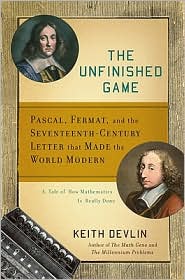
Every so often, I read a book about math. I couldn't really tell you why--call it a strange and inexplicable desire to understand how the world works on a level I don't spend much time on anymore (one semester of college calculus was enough for this liberal arts major, thank you very much), or call it pretension to a much broader intellect than I actually possess. I'm not sure, and I'm not willing to submit to analysis in order to find out. But the fact remains: a couple times a year, maybe, I read a book about math. And this time, it was Keith Devlin's The Unfinished Game, a decidedly not-for-mathematicians account of the roots and early development of probability theory. As math books go, it was in my opinion a particularly interesting one, taking as its basic unit of analysis and discussion a seventeenth century letter written by Blaise Pascal to Pierre de Fermat. Devlin's story doesn't stop there, of course (the book wouldn't have been too interesting if it had), but actually goes on to describe where probability went from there, and how it wound up even approximating the variety we're offhandedly familiar with today. Devlin alleges that this letter essentially marks a transformational point in man's evolution, at which s/he began to view the world in an entirely different and modern way. Prior to probability, Devlin alleges, the future was completely uncontrollable, entirely the realm of chance; afterward, it could be prepared for in certain ways, even predicted to a small extent. Without going into tremendous detail, I'll note that Devlin never had me entirely convinced, but was operating with a limited amount of text and without any extensive knowledge on my part of thought/behavior patterns of the 1600s, so I was willing to give him the benefit of the doubt. Did this book inspire in me the desire to actually develop an extensive knowledge of those patterns? Well, no. But it did teach me a lot about the genesis of modern probability theory that I didn't know--knowledge that may eventually come in handy at a bar quiz, especially pretentious dinner party, or some other occasion. So a B+ to you, Mr. Devlin, and a thank-you for making this math particularly readable.



No comments:
Post a Comment